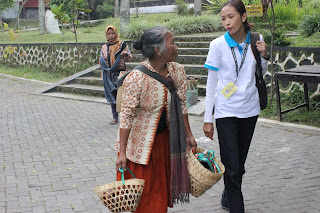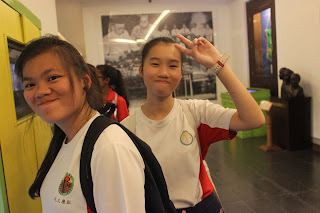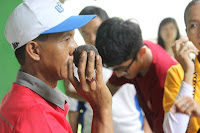Day 6:
Today we revisited Mt Merapi to acquire a more clearer view of Mt Merapi, but it turns out that it was covered with a thick cloud which was much more worse than yesterday's visit. Although it did not turned out well, we still get to experienced a closer view of the 2 hills near Mt Merapi.
After we ate lunch, we visited the Benteng Vreteburg Meseum in which we learnt the difficult road to independence that Indonesia had to go through to achieve independence from dutch colonial rule. We also learnt of the sacrifices the Indonesians made for such an achievement in which they were very proud of.
After that, we went to Marlioboro street to shop around for unique trinkets and shirts. We also got to experience bargaining to a great extent such that we can bargain to half the initial price. There were also many special items and keychains, especially souvenirs in the street. We got to also see traditional clothing and their wet markets which were extremely crowded with people.
After the shopping frenzy, we headed to a silver factory where we saw how was silver made into many different shapes and sizes. We also bought souvenirs for ourselves and our family members back home. Some of us also went to a near by coffee shop where we bought a very unique coffee.
We ended off with a scrumptious dinner and headed back to the hotel.
Group 3: Sam, Jeremy, Kash, Istighfar, Jamie, Pamela
Credits to Max Zhang, 3D for the awesome pictures.
PSS Yogya Cultural Immersion 2015
Wednesday, 3 June 2015
Post-Trip Reflection
Hello this is the Post-Trip Reflection Please answer the given questions below thank you
- Why was the trip a valuable learning experience for you?
- Why was the trip an enjoyable experience for you?
- Why would you recommend this cultural immersion trip to other students of Punggol Secondary School?
Tuesday, 2 June 2015
Day Five
Today, we visited the area surrounding Mt Merapi. We were able to see the destruction the eruption from 2010 caused in that region. The rivers,Kaligendol and Kaliadem were covered in ash and solidified lahar. The solidified lahar covered up the water in the rivers. The lahar was able to reach the river via the river channel, the lahar flowed into the rivers as the river channel had lesser resistance compared to the surrounding lands. The livelihood of the residents, houses, and farms were badly affected by the eruption.
We also visited the Mount Merapi Museum, where we learnt about the causes of the eruption. Furthermore, we also found out about the various types of volcano formations and eruptions around the world. Afterwards, we were shown a short film which gave us more information on Mt Merapi and how the mountain was analyzed.
Lastly, we visited the Yogya T-Shirt store. The shirts in the store were all hand-made, which made the store special and a hot spot for tourists in Yogyakarta. The designs on the T-Shirts showcased the landmarks in Yogyakarta.
Compassion improved today between team members as care and concern was shown towards each other during the treking to kaligendol river.
Group 1 // Amal, Iqbal, Donovan, Madhumita, Samantha, Ting Feng, Shohaib
Credits to Max Zhang from 3D for the awesome photos.
We also visited the Mount Merapi Museum, where we learnt about the causes of the eruption. Furthermore, we also found out about the various types of volcano formations and eruptions around the world. Afterwards, we were shown a short film which gave us more information on Mt Merapi and how the mountain was analyzed.
Lastly, we visited the Yogya T-Shirt store. The shirts in the store were all hand-made, which made the store special and a hot spot for tourists in Yogyakarta. The designs on the T-Shirts showcased the landmarks in Yogyakarta.
Compassion improved today between team members as care and concern was shown towards each other during the treking to kaligendol river.
Group 1 // Amal, Iqbal, Donovan, Madhumita, Samantha, Ting Feng, Shohaib
Credits to Max Zhang from 3D for the awesome photos.
Monday, 1 June 2015
Day Four:
Today we visited the farm to engage in agricultural activities and toured around the village, which we took a look at the living conditions of the villagers and their houses. It was a huge eyeopener as a traditional village cannot be seen often in Singapore. In the farm, we planted rice and lettuce which was a new experience for us as it is the first time we have been to a plantation. It was a great experience as we get to appreciate the hard work the farmers put into harvesting and planting these crops to put food on our tables. We also participated in feeding the animals at the farm such as cows, buffaloes, deer and sheep.
After the farm visit, we visited the Plaosan Temples, which was made up of two twin temples. The reason behind the twin temples was that they were made by King Rakai Pikatan for his wife at that time. It is a combination of Hindu and Buddhist architecture and religion.
Group 1: Borg, Nasyrah, Tifal, Bryan, WeiZhao, Max, XuanYuan, WeiHao.
Welcome foodpack from the farmers
Students walking to the farm!
Serine helping us to cross the 'bridge' .
Tour guides explaining the 2nd usage of the
flour pounder, which was to create music.
Cows by the barn.
 |
| The guide explaining the space efficient way of planting lettuce. |
 |
| Engaging in traditional planting of lettuce. |
 |
| Planting of rice in the fields. |
Group photo with the farmers
before we embarked on the planting of crops
Punggol Secondary farmers !!
Tour guide explaining the making of meatballs.
Mr Shahrom!
Village children playing in the farm.
Students feeding the farm animals.
Tour guide demonstrating.
Students making our very own salted duck eggs!!
 |
| Plaosan Temple, or twin temples. |
Subscribe to:
Comments (Atom)













































